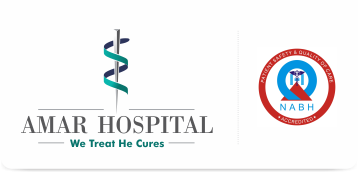Cancer remains one of the most formidable health challenges worldwide, with early detection playing a pivotal role in improving outcomes. Recognizing the warning signs and symptoms associated with various types of cancer is crucial for prompt diagnosis and intervention. In this blog, we explore common early indicators of cancer across different types and emphasize the importance of book doctor appointment promptly for evaluation and treatment.
Also Read: Understanding Emergencies: Amar Hospital’s Neurologist 24/7 Support for Critical Cases
Understanding Cancer Warning Signs
Cancer manifests through a myriad of symptoms, often varying depending on the type and location of the tumor. While some warning signs may be subtle or easily overlooked, others may be more pronounced and indicative of underlying malignancy. It is essential to remain vigilant and proactive in recognizing potential signs of cancer, as early detection significantly increases the likelihood of successful treatment and recovery.
Common Cancer Early Warning Signs
- Unexplained Weight Loss: Sudden and unexplained weight loss, especially without changes in diet or exercise habits, may indicate an underlying health issue, including certain types of cancer such as pancreatic, stomach, or lung cancer. Rapid and unintentional weight loss should prompt a visit to your healthcare provider for further evaluation.
- Persistent Fatigue: While fatigue is a common symptom experienced by many, persistent and unrelenting fatigue that interferes with daily activities and does not improve with rest may warrant investigation. Fatigue can be a symptom of various cancers, including leukemia, lymphoma, and colon cancer, among others.
- Changes in Bowel or Bladder Habits: Persistent changes in bowel habits, such as diarrhea, constipation, or changes in stool consistency, could be indicative of colorectal cancer. Similarly, frequent urination, blood in the urine, or changes in bladder function may signal bladder or prostate cancer and necessitate medical assessment.
- Unexplained Pain: Persistent or worsening pain that cannot be attributed to an injury or underlying medical condition should raise concern, as it could be a symptom of several types of cancer, including bone, ovarian, or pancreatic cancer. Prompt evaluation by a healthcare professional is essential to determine the underlying cause and initiate appropriate treatment.
Book Doctor Appointment
If you experience any concerning symptoms suggestive of cancer, it is imperative to schedule a doctor appointment promptly for evaluation and further investigation. Early detection and diagnosis are critical for initiating timely treatment and improving prognosis. When book your appointment, be sure to communicate your symptoms and concerns clearly to your healthcare provider, who can conduct a thorough examination, and order diagnostic tests.
Importance of Timely Intervention
Delaying or ignoring symptoms of cancer can significantly impact outcomes and diminish the effectiveness of treatment options. Book doctor appointment at the onset of warning signs, you can expedite the diagnostic process and access timely interventions, such as imaging studies, laboratory tests, or biopsy procedures, if necessary. Your healthcare provider can offer guidance, support, and access to specialized care to address your concerns and facilitate a comprehensive approach to cancer detection and management.
Leveraging Screening Programs
In addition to recognizing and addressing symptoms, participating in cancer screening programs can further enhance early detection efforts. Screening tests, such as mammograms for breast cancer, Pap smears for cervical cancer, and colonoscopies for colorectal cancer, aim to detect abnormalities or precancerous changes before symptoms develop. By adhering to recommended screening guidelines based on age, gender, and risk factors, individuals can proactively identify potential cancerous growths at an early stage when treatment is most effective. Consulting with your healthcare provider about appropriate screening protocols and scheduling regular screenings can be instrumental in detecting cancer early and improving outcomes.
Prioritizing Personal Health
Maintaining a healthy lifestyle and prioritizing regular medical check-ups are essential components of cancer prevention and early detection. Adopting habits such as eating a balanced diet, engaging in regular physical activity, avoiding tobacco products, limiting alcohol consumption, and managing stress can help reduce the risk of developing cancer and improve overall well-being. Additionally, staying informed about a family history of cancer and discussing screening options with your healthcare provider can empower you to take proactive steps toward prevention and early detection. Investing in your health today can have significant benefits for your future.
Advocating for Awareness
Raising awareness about the importance of early detection and timely intervention is key to combatting the burden of cancer in our communities. By engaging in advocacy efforts, supporting cancer research initiatives, and promoting education about cancer prevention and screening, we can empower individuals to take proactive steps towards their health and encourage policy changes that prioritize cancer care and research funding. Together, we can work towards a future where cancer is detected early, treated effectively, and ultimately, eradicated. At Amar Hospital, we are committed to promoting cancer awareness and providing comprehensive care to individuals affected by cancer. Schedule your doctor appointment today and take control of your health journey.
Conclusion
Recognizing the early warning signs of cancer and taking proactive steps to book doctor appointment for evaluation is essential for timely diagnosis and treatment. By staying vigilant and attentive to changes in your body, you can play an active role in safeguarding your health and well-being. At Amar Hospital, our dedicated team of healthcare professionals is committed to providing compassionate and comprehensive care to individuals seeking evaluation and management of cancer symptoms. Don’t hesitate to schedule your appointment if you have any concerns or questions regarding your health. Early detection saves lives.


